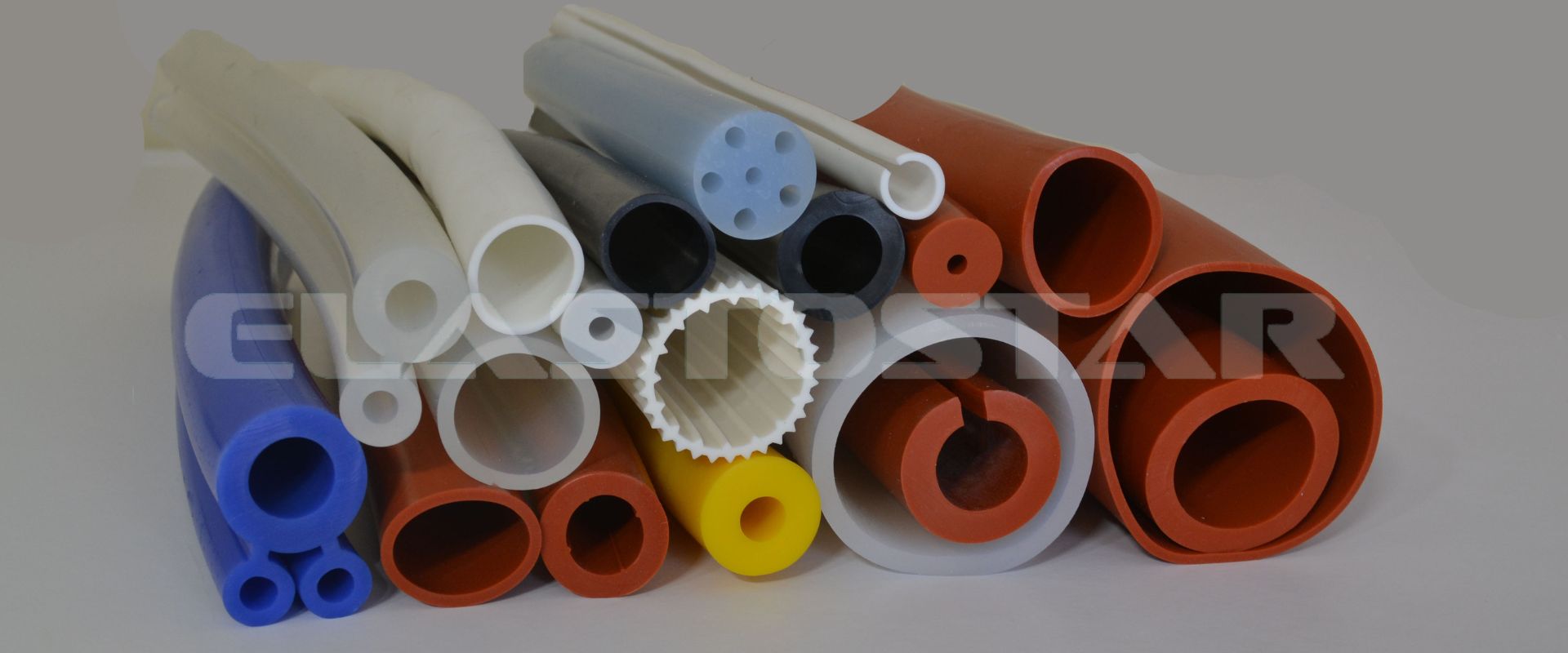The Silicone Rubber Tubing: Your Go-To Resource for Durability and Versatility

When it comes to durability and versatility, silicone rubber tubing is the go-to resource for various industries and applications. With its exceptional properties and wide range of uses, this type of tubing has become a staple in medical, automotive, and manufacturing fields, among others.
Silicone rubber tubing is known for its resistance to extreme temperatures, making it ideal for high-temperature applications such as medical devices, engines, and electrical systems. Its flexibility and ability to maintain its shape under pressure make it a reliable choice for fluid and gas transfer in both industrial and healthcare settings.
Moreover, silicone rubber tubing is highly inert and does not react with most chemicals, ensuring that delicate substances or compounds remain uncontaminated during transportation.
Not only does silicone tubing excel in performance, but it also offers superior longevity, outlasting other materials. Its resistance to aging, weathering, and UV radiation makes it an excellent investment for long-term usage.
In summary, the silicone rubber tubing is a durable and versatile resource that meets the demands of a wide range of industries and provides reliability, flexibility, and longevity.
Advantages of using silicone rubber tubing
Silicone rubber tubing offers numerous advantages that make it the preferred choice for many applications. Firstly, its resistance to extreme temperatures sets it apart from other materials. Silicone can withstand both high and low temperatures, making it ideal for use in environments where temperature fluctuations are common. This quality makes it suitable for applications such as medical devices, engines, and electrical systems.
Secondly, silicone rubber tubing is highly flexible, allowing it to maintain its shape under pressure. This flexibility makes it an excellent choice for fluid and gas transfer in both industrial and healthcare settings. Whether it's a medical device requiring the safe transportation of liquids or a manufacturing process that relies on the efficient flow of gases, silicone tubing provides the necessary flexibility and durability.
Another advantage of silicone rubber tubing is its excellent chemical resistance. Silicone is highly inert and does not react with most chemicals. This property ensures that delicate substances or compounds remain uncontaminated during transportation. Industries such as pharmaceuticals, food and beverage, and chemical manufacturing rely on silicone tubing to maintain the integrity and purity of their products.
Furthermore, silicone rubber tubing is known for its longevity. It outlasts other materials and can withstand the test of time. Its resistance to aging, weathering, and UV radiation makes it an excellent investment for long-term usage. This durability ensures that industries can rely on silicone tubing for extended periods without worrying about frequent replacements or repairs.
In summary, the advantages of using silicone rubber tubing include its resistance to extreme temperatures, flexibility under pressure, chemical inertness, and longevity. These properties make silicone tubing the top choice for industries that require durable and versatile materials.
Applications of silicone rubber tubing
Silicone rubber tubing finds uses in a wide range of applications across various industries. Its versatility and superior properties make it suitable for demanding environments and specialized requirements. Here are some of the common applications of silicone rubber tubing:
- Medical industry: Silicone tubing is widely used in the medical field due to its biocompatibility and resistance to extreme temperatures. It is commonly employed in medical devices such as catheters, surgical instruments, and implants. Silicone tubing ensures the safe and efficient transfer of fluids, gases, and medications in medical procedures.
- Automotive industry: Silicone rubber tubing plays a crucial role in automotive applications. It is used in engine systems for coolant and oil transfer, as well as in fuel systems for efficient fuel delivery. Silicone tubing's resistance to high temperatures and chemicals makes it suitable for the demanding conditions of the automotive industry.
- Manufacturing industry: Silicone tubing is extensively utilized in the manufacturing sector for various purposes. It is commonly employed for fluid and gas transfer in industrial processes, ensuring efficient operations. Additionally, silicone tubing finds applications in the production of consumer goods such as electronics, appliances, and toys.
- Food and beverage industry: Silicone rubber tubing is widely used in the food and beverage industry due to its inertness and compliance with food safety regulations. It is used for the transfer of liquids, gases, and ingredients in food processing and packaging. Silicone tubing ensures the integrity and quality of food products throughout the manufacturing and distribution processes.
- Electronics industry: Silicone tubing finds applications in the electronics industry for insulation, protection, and sealing purposes. It is used to insulate wires and cables, providing electrical and thermal conductivity. Silicone tubing also protects sensitive electronic components from moisture, dust, and other environmental factors.
- Aerospace industry: Silicone rubber tubing is utilized in the aerospace industry for various applications. It is used in fuel systems, hydraulic systems, and air conditioning systems. Silicone tubing's resistance to extreme temperatures, chemicals, and pressure makes it suitable for the demanding conditions of aerospace engineering.
These are just a few examples of the wide range of applications where silicone rubber tubing proves its versatility and reliability. Its unique properties make it indispensable in numerous industries, ensuring safe and efficient operations.
Types of silicone rubber tubing
Silicone rubber tubing is available in different types to suit specific requirements and applications. The choice of silicone tubing depends on factors such as temperature range, chemical compatibility, flexibility, and pressure resistance. Here are some common types of silicone rubber tubing:
- General purpose silicone tubing: This type of silicone tubing is suitable for a wide range of applications. It offers good temperature resistance, flexibility, and durability. General purpose silicone tubing is commonly used in industries such as manufacturing, automotive, and electronics.
- High-temperature silicone tubing: High-temperature silicone tubing is designed to withstand extreme heat. It can handle temperatures well above what general purpose silicone tubing can withstand. This type of tubing is commonly used in applications such as engine systems, exhaust systems, and industrial processes involving high temperatures.
- Medical-grade silicone tubing: Medical-grade silicone tubing is specifically formulated to meet the stringent requirements of the medical industry. It is biocompatible, non-toxic, and resistant to bodily fluids and sterilization processes. Medical-grade silicone tubing is used in medical devices, surgical instruments, and implants.
- Food-grade silicone tubing: Food-grade silicone tubing is specially formulated to comply with food safety regulations. It is non-toxic, odorless, and resistant to microbial growth. This type of tubing is commonly used in the food and beverage industry for the transfer of liquids, gases, and ingredients.
- Chemical-resistant silicone tubing: Chemical-resistant silicone tubing is designed to withstand exposure to a wide range of chemicals and solvents. It offers excellent resistance to corrosion and degradation. This type of tubing is commonly used in industries such as chemical manufacturing, pharmaceuticals, and laboratories.
These are just a few examples of the types of silicone rubber tubing available in the market. Each type offers specific properties and characteristics to suit different applications. It is essential to choose the right type of silicone tubing based on the requirements of your industry or application.
Choosing the right silicone rubber tubing for your needs
When selecting silicone rubber tubing for your specific needs, several factors should be considered. These factors will ensure that you choose the most suitable tubing for your application and maximize its performance and longevity. Here are some key considerations:
- Temperature range: Determine the temperature range your silicone tubing needs to withstand. Consider the minimum and maximum temperatures it will be exposed to during operation. Choose a tubing type that can handle the temperature extremes of your application.
- Chemical compatibility: Assess the chemicals and substances that the silicone tubing will come into contact with. Ensure that the tubing is compatible with these chemicals to avoid degradation or contamination. Consult the tubing manufacturer's chemical compatibility chart for guidance.
- Flexibility and pressure resistance: Evaluate the flexibility and pressure resistance requirements of your application. Consider the flow rate, pressure levels, and any bending or kinking that the tubing may experience. Choose a tubing type that offers the necessary flexibility and pressure resistance.
- Size and dimensions: Determine the required size and dimensions of the silicone tubing based on your application's specifications. Consider the inner diameter, outer diameter, and wall thickness of the tubing. Ensure that the chosen tubing size fits your equipment and plumbing systems.
- Certifications and compliance: If your application requires specific certifications or compliance with industry standards, ensure that the silicone tubing meets these requirements. Examples of certifications include FDA compliance for food-grade tubing and ISO certification for medical-grade tubing.
- Supplier reliability and support: Choose a reputable supplier that offers reliable products and excellent customer support. Consider factors such as product warranties, technical assistance, and prompt delivery. A reliable supplier will ensure that you receive high-quality silicone tubing and assistance when needed.
By considering these factors, you can select the right silicone rubber tubing for your specific needs. Taking the time to assess your requirements and consult with experts will ensure optimal performance and longevity of the tubing in your application.
Proper maintenance and care for silicone rubber tubing
To maximize the lifespan and performance of silicone rubber tubing, proper maintenance and care are essential. Although silicone tubing is highly durable, taking the following precautions will ensure its longevity:
- Regular cleaning: Clean the silicone tubing regularly using mild soap or detergent and warm water. Rinse thoroughly to remove any residue. Avoid using harsh chemicals or abrasive cleaners that may damage or degrade the tubing.
- Inspect for damage: Regularly inspect the silicone tubing for any signs of damage or wear. Look for cracks, tears, or degradation. If any damage is found, replace the tubing immediately to avoid leaks or failure.
- Avoid extreme temperatures: Although silicone tubing is designed to withstand extreme temperatures, it is best to avoid subjecting it to unnecessary temperature extremes. Excessive heat or cold can accelerate aging and degradation of the tubing.
- Store properly: Store silicone tubing in a cool and dry place away from direct sunlight. Avoid storing it near heat sources or in humid environments. Proper storage conditions will prevent premature aging and degradation of the tubing.
- Use compatible fittings: Ensure that the fittings and connectors used with the silicone tubing are compatible and properly installed. Incorrect fittings or improper installation can lead to leaks or damage to the tubing.
- Follow manufacturer guidelines: Follow the manufacturer's guidelines for the specific silicone tubing you are using. These guidelines may include recommended operating temperatures, pressure limits, and cleaning instructions. Adhering to these guidelines will ensure optimal performance and longevity.
By following these maintenance and care practices, you can extend the lifespan of silicone rubber tubing and ensure its reliable performance in your application.
Common misconceptions about silicone rubber tubing
Despite its widespread use and numerous advantages, there are some common misconceptions about silicone rubber tubing. Addressing these misconceptions will help dispel any doubts or concerns related to using silicone tubing. Here are a few misconceptions and the corresponding facts:
- Misconception: Silicone tubing is expensive.
Fact: While silicone tubing may have a higher upfront cost compared to some other materials, its longevity and durability make it a cost-effective choice in the long run. The extended lifespan and reduced need for frequent replacements outweigh the initial investment. - Misconception: Silicone tubing is not suitable for high-pressure applications.
Fact: Silicone tubing is available in various formulations that offer excellent pressure resistance. High-pressure silicone tubing can handle demanding applications without compromising performance or durability. It is essential to choose the appropriate silicone tubing with the required pressure rating for your application. - Misconception: Silicone tubing is not compatible with all chemicals.
Fact: Silicone rubber tubing is highly inert and does not react with most chemicals. However, there are some chemicals and solvents that may cause degradation or swelling of silicone tubing. It is crucial to consult the manufacturer's chemical compatibility chart to ensure compatibility with specific chemicals. - Misconception: Silicone tubing is not suitable for extreme temperatures.
Fact: Silicone rubber tubing is known for its excellent temperature resistance. It can withstand both high and low temperatures, making it suitable for a wide range of applications. High-temperature silicone tubing can handle temperatures well above what general-purpose tubing can withstand.
Addressing these misconceptions will help industries and users make informed decisions when considering silicone rubber tubing for their applications. Understanding the facts about silicone tubing's properties and capabilities will ensure its proper utilization and maximize its benefits.
Tips for purchasing silicone rubber tubing
When purchasing silicone rubber tubing, it is essential to consider several factors to ensure that you obtain the right product for your needs. Here are some tips to help you make an informed purchase decision:
- Determine your requirements: Assess your application's specific requirements, such as temperature range, chemical compatibility, flexibility, and pressure resistance. This will help you narrow down the options and choose the most suitable silicone tubing.
- Research reputable suppliers: Look for reputable suppliers that specialize in silicone rubber tubing. Consider factors such as product quality, customer reviews, certifications, and customer support. A reliable supplier will ensure that you receive high-quality silicone tubing and assistance when needed.
- Request samples: If possible, request samples from potential suppliers to evaluate the silicone tubing's quality and performance. This will allow you to assess its physical properties, such as flexibility, durability, and chemical resistance.
- Consult with experts: If you have specific or complex requirements, consult with experts or engineers specializing in silicone rubber tubing. They can provide guidance and recommendations based on their expertise and experience.
- Compare prices and warranties: Compare prices from different suppliers to ensure that you get the best value for your investment. Consider factors such as product warranties, technical support, and delivery options. Choose a supplier that offers competitive pricing and favorable warranty terms.
- Consider customization options: If your application requires specific dimensions, colors, or other customization options, inquire whether the supplier can accommodate these requirements. Customization may incur additional costs or lead time, so consider these factors when making your purchase decision.
By following these tips, you can ensure that you purchase high-quality silicone rubber tubing that meets your specific needs and provides reliable performance.
Silicone rubber tubing in different industries
Silicone rubber tubing finds extensive use in various industries due to its exceptional properties and versatility. Here are some examples of how silicone tubing is utilized in different sectors:
- Medical industry: Silicone tubing is a critical component in medical devices such as catheters, respirators, and IV sets. The biocompatibility, flexibility, and resistance to extreme temperatures make it ideal for these applications. Silicone tubing ensures the safe and efficient delivery of fluids, gases, and medications in medical procedures.
- Automotive industry: Silicone rubber tubing plays a vital role in automotive applications, particularly in engine systems, cooling systems, and fuel systems. Its ability to withstand high temperatures, resistance to chemicals, and durability make it suitable for these demanding environments. Silicone tubing ensures efficient fluid transfer and contributes to the reliable performance of vehicles.
- Manufacturing industry: Silicone tubing is widely used in the manufacturing sector for fluid and gas transfer in various industrial processes. It ensures the efficient operation of machinery and systems, contributing to increased productivity and reduced downtime. Additionally, silicone tubing is employed in the production of consumer goods such as electronics, appliances, and toys.
- Food and beverage industry: Silicone rubber tubing is a staple in the food and beverage industry due to its compliance with food safety regulations. It is used for the transfer of liquids, gases, and ingredients in food processing and packaging. Silicone tubing ensures the integrity and quality of food products throughout the manufacturing and distribution processes
- Electronics industry: In the electronics sector, silicone tubing serves multiple purposes, primarily for insulation, protection, and sealing. It plays a crucial role in safeguarding wires and cables, ensuring both electrical and thermal conductivity. Additionally, silicone tubing acts as a barrier, shielding sensitive electronic components from moisture, dust, and other environmental factors, thereby extending their lifespan and reliability.
- Aerospace industry: Silicone rubber tubing is indispensable in aerospace engineering, where it is utilized across various applications. It finds extensive use in fuel systems, hydraulic systems, and air conditioning systems within aircraft. Due to its exceptional resistance to extreme temperatures, chemicals, and pressure, silicone tubing ensures the safe and efficient operation of aerospace equipment under demanding conditions, contributing to the overall safety and reliability of flights.
- Renewable energy sector: With the growing emphasis on sustainability and renewable energy sources, silicone rubber tubing has found new applications in this sector. It is used in solar panel manufacturing for encapsulation and insulation purposes, protecting delicate components from environmental stressors. Additionally, silicone tubing is employed in geothermal energy systems for fluid transfer, contributing to the efficient harnessing of renewable energy resources.
- Research and development: Silicone rubber tubing plays a vital role in research and development activities across various industries. Its versatility and reliability make it an essential component in laboratory equipment, experimental setups, and prototype testing. Whether it's for fluid handling, sample transfer, or equipment fabrication, silicone tubing provides the flexibility and durability required for diverse R&D applications.
- Emerging technologies: As new technologies continue to emerge, silicone rubber tubing adapts to meet evolving needs. From biotechnology and nanotechnology to advanced materials and 3D printing, silicone tubing finds applications in cutting-edge industries. Its inertness, flexibility, and longevity make it a preferred choice for integrating with innovative technologies, facilitating progress and innovation across various fields.
- Innovations in silicone rubber tubing: The ongoing advancements in materials science and manufacturing processes lead to continuous improvements in silicone rubber tubing. Innovations such as enhanced temperature resistance, advanced chemical compatibility, and novel formulations expand the capabilities and applications of silicone tubing. Additionally, developments in customization options, such as tailored sizes, colors, and surface properties, offer greater flexibility to meet specific industry requirements.
Conclusion:
Silicone rubber tubing remains a versatile and indispensable resource across diverse industries, thanks to its exceptional properties and wide-ranging applications. From medical devices and automotive systems to manufacturing processes and beyond, silicone tubing continues to play a crucial role in ensuring the safety, efficiency, and reliability of various applications. As industries evolve and new technologies emerge, silicone rubber tubing will continue to adapt and innovate, maintaining its status as a go-to resource for durability and versatility.
By providing reliable performance, longevity, and adaptability, silicone rubber tubing empowers industries to overcome challenges, drive innovation, and achieve their goals efficiently. With ongoing research and advancements, silicone tubing will continue to evolve, meeting the evolving needs of diverse industries and contributing to progress and development on a global scale.
BusinessYou may be interested in these jobs
-

Assembler
2 weeks ago
Schweitzer Engineering Laboratories, Inc. Lake Zurich, United StatesSchweitzer Engineering Laboratories (SEL) seeks Assemblers who are motivated to work on our Manufacturing team SEL fosters a collaborative culture in a light manufacturing environment, that is clean and safe. In addition to a starting salary of $20.00 (plus $1.75 shift differenti ...
-

Retail Sales
1 week ago
Cracker Barrel Kodak, United StatesStore Location: US-TN-Kodak Overview: If you're passionate about a great guest experience and true hospitality, this is the role for you Whether you're helping a guest find the perfect birthday gift or showing off your favorite items from the new collection, you'll make sure ever ...
-

Retail Sales Consultant Bethpage, NY,
1 week ago
The Adecco Group Bethpage, United StatesAdecco has a direct hire opportunity for a. Retail Sales Consultantposition in Bethpage, NY. We are looking for friendly, reliable, responsible individuals to work in a fast-paced environment in a dynamic space with one-on-one customer contact. A ba Sales Consultant, Retail Sales ...
Comments